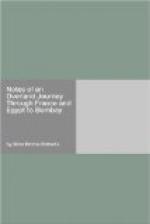Engravings have made every inquiring person well acquainted with the celebrated monument which goes by the name of “Pompey’s Pillar,” and the feelings with which we gazed upon it are much more easily imagined than described. It has the advantage of standing upon a rather considerable elevation, a ridge of sand, and below it are strewed vast numbers of more humble memorials of the dead. The Turkish and the Arab burial-grounds spread themselves at the feet of the Pillar: each grave is distinguished by a mound of earth and a stone. The piety of surviving relatives has, in some places, forced the stubborn sand to yield proofs of their affectionate remembrance of the deceased; occasionally, we see some single green plant struggling to shadow the last resting-place of one who slept below; and if any thing were wanting to add to the melancholy of the scene, it would have been the stunted and withering leaves thus mournfully enshrouding the silent dead. There is something so unnatural in the conjunction of a scanty vegetation with a soil cursed with hopeless aridity, that the gardens and few green spots, occurring in the neighbourhood of Alexandria, detract from, instead of embellishing, the scene. Though pleasant and beautiful as retreats to those who can command an entrance, these circumscribed patches of verdure offend rather than please the eye, when viewed from a distance.
The antiquities of Egypt have been too deeply studied by the erudite of all Christian countries, for an unlearned traveller to entertain a hope of being able to throw any additional light upon them. Modern tourists must, therefore, be content with the feelings which they excite, and to look, to the present state of things for subjects of any promise of interest to the readers of their journals.
After breakfast, we received a visit from the Egyptian gentleman who had been our fellow-passenger. He brought with him a friend, who, like himself, had been educated in England, and who had obtained a good appointment, together with the rank of a field officer, from the Pasha. The manners of the gentleman were good; modest, but not shy. He spoke excellent English, and conversed very happily upon all the subjects broached. Our friend was still in doubt and anxiety respecting his own destination. Mehemet Ali had left Alexandria for one of his country residences, on the plea of requiring change of air; but, in reality, it was said, to avoid the remonstrances of those who advocated a policy foreign to his wishes. The new arrival could not present himself to the minister until he should be equipped in an Egyptian dress. The friend who accompanied him gave us the pleasing intelligence, that a large handsome boat, with ladies’ cabin detached, and capable of carrying forty passengers, had been built by the merchants of Alexandria, and when completed—and it only wanted painting and fitting up—would convey travellers up the canal to Atfee, a distance which, towed by horses, it would perform in twelve hours. Small iron steamers were expected from England, to ply upon the Nile, and with these accommodations, nothing would be more easy and pleasant than a journey which sometimes takes many days to accomplish, and which is frequently attended with inconvenience and difficulty.




